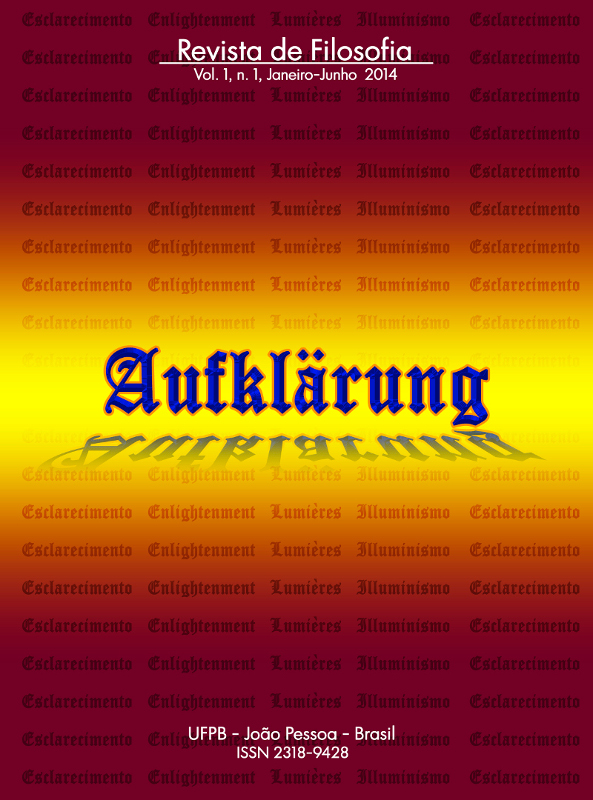On Ethical Fundamentalisms
DOI:
https://doi.org/10.18012/arf.2016.18504Keywords:
Fundamentalism, fanaticism, ethicsAbstract
The history involves diverse types of fundamentalism. This article highlights a variety of ethical fundamentalist thoughts that marked humanity and were challenged by thinkers and intellectuals. The fundamentalism originates in the interpretation of doctrines isolated from their historical context and without room for criticism. As understood in the entry in Voltaire´s Dictionnaire philosophique_(1752), fundamentalism is closely related to fanaticism. The practice of interpreting any one doctrine as containing a single fundamental truth can result in a type of blindness that impedes the ability to observe reality with a critical spirit. Certain modern thinkers generally associate fundamentalism with religion and hold it responsible for great human tragedy._ However, fundamentalism unrelated to religion was also spread and likewise caused insurmountable damage to human life. Fundamentalism is defined in the following terms: philosophical, scientific, totalitarian and economic. In as much as one tries to identify and denounce fundamentalism, it seems that it continues to appear in the course of human relations. Whenever critics stand against determined fanaticisms, others will arise to be denounced._ This discussion might be considered trivial if the current state of affairs did not threaten human life, and if predictions were favorable for the life of our species on this planet.Downloads
References
ADORNO, Theodor. HORKHEIMER, Max. Dialética do Esclarescimento. Trad. Guido Antonio de Almeida. Rio de Janeiro: Zahar, 2011.
BOFF, Leonardo. Fundamentalismo, terrorismo, religião e paz. Petrópolis: Vozes, 2009.
CASSIRER, Ernst. A filosofia do iluminismo. Trad. Álvaro Cabral. 2ª ed. Campinas: Editora da Unicamp, 1995.
COMPARATO, Fábio Konder. Ética. São Paulo: Companhia das Letras, 2006.
JONAS, Hans. Ética Medicina e técnica. Trad. Fernando António Cascais. Lisboa: Veja, 1994.
LEÃO, Emmanuel Carneiro. Aprendendo a pensar. 2ª ed. Petrópolis: Vozes, 1989.
KÜNG, Hans. Projeto de ética mundial: Uma moral ecumênica em vista da sobrevivência humana. Trad. Haroldo Reimer. 4ª ed. São Paulo: Paulinas, 2003.
ROUSSEAU, Jean-Jacques. Textos autobiográficos e outros escritos. Trad. Fúlvia M. L. Moretto. São Paulo: Editora Unesp, 2009.
SANTOS, Milton. Por uma outra globalização: do pensamento único à consciência universal. 14ª. Rio de Janeiro: Record: 2007.
SINGER, Peter. Ética prática. Trad. Jefferson Luiz Camargo. 3a ed. São Paulo: Martins Fontes, 2002.
VOLTAIRE, François Marie Arouet. Tratado sobre a tolerância. Trad. Paulo Neves. 2ª ed. São Paulo: Martins Fontes, 2000.
____. Várias Obras. 2ª ed. Coleção Os Pensadores. Tradução de Marilena de Souza Chauí. São Paulo: Nova Cultural, 1983 (ps. 85-295).
Additional Files
Published
How to Cite
Issue
Section
License
Journal general policy
1.This journal works under a Creative Commons License aplied to online journals. That icence can be read in the following link: Creative Commons Attribution 4.0 International (CC BY 4.0).
2.Accordingly to this License, a)the journal declares that authors hold the copyright of their articles without restrictions, and they can archieve them as post-print elsewhere. b)the journal allow the author(s) to retain publishing rights without restrictions.
Metadata Policy for information describing items in the repository
1. Anyone may access the metadata free of charge at anytime.
2.The metadata may be re-used in any medium without prior permission, even commercial purposes provided the OAI Identifier or a link to the original metadata record are given, under the terms of a CC BY license refered for the Journal.







































